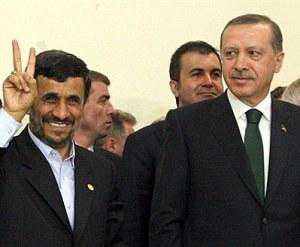
Freedom’s Edge
Turkey’s Hollow Prize
Claudia Rosett, 06.18.10, 11:21 AM EDT
Washington’s Woodrow Wilson Center dishonors its own public service award.
Canada Free Press
June 19 2010
By Claudia Rosett Friday, June 18, 2010
– Forbes
It’s time Congress pulled the plug on Washington’s taxpayer-subsidized
Woodrow Wilson Center for International Scholars, which has turned
itself into a global joke. With Turkey’s leaders coquetting as the new
best bedfellows of Iran and embracing the terrorists of Hamas, the
Wilson Center has just bestowed its `Public Service’ award on Turkey’s
foreign minister, Ahmet Davutoglu.
In tandem with rewarding Davutoglu for catalyzing `the development of
Turkey’s foreign relations,’ the Wilson Center also honored a Turkish
business tycoon, Ferit Sahenk, with its Woodrow Wilson Award for
Corporate Citizenship. The two winners received their prizes at a
banquet held Thursday evening at the plush Four Seasons Hotel in
Istanbul.
In a June 8 press release the Wilson Center’s president, former
congressman Lee Hamilton, explained that Davutoglu and Sahenk had been
chosen because `These two leaders personify the attributes we seek to
honor at the Woodrow Wilson Center.’ I mean no insult to Sahenk’whose
prizeworthy business skills I don’t question’but it’s hard to escape
the conclusion that the chief attributes the Wilson Center has just
sought to honor in Istanbul are antagonism toward American values
(Davutoglu) and enormous amounts of money (Sahenk).
Created in 1968 by an act of Congress, the Wilson Center describes
itself on its website as a `nonpartisan institute,’ a `living,
national memorial’ to President Woodrow Wilson, charged with
`symbolizing and strengthening the fruitful relations between the
world of learning and the world of public affairs.’ Functioning as a
`public-private partnership,’ the Wilson Center in recent times has
been receiving roughly one-third of its yearly operating funds from
the U.S. government (in other words, from U.S. taxpayers). Thus
credentialed by Congress and anchored in federal subsidies, it
attracts the rest of its money from a global array of public and
private sources. Its current annual expenses are budgeted at more than
$37.3 million.
Housed on prime real estate, just blocks from the White House, the
Wilson Center occupies, ironically enough, a lavishly appointed
eight-story wing of the Ronald Reagan International Trade Building. It
has a big vestibule with polished granite and marble floors, some of
Wilson’s words chiseled in stone, and multiple levels of roomy offices
and meeting rooms, ample armchairs, a cafeteria and a private library.
All this is supposed to serve the Center’s aim `to shed the light of
the timeless on the timely.’
>From this perch, with atrocious timing, the Wilson Center last August
invited Davutoglu to receive its public service award this June, `in
recognition of his lifelong service to the Turkish public.’
This is a bizarre spin on Davutoglu’s major role in steering the
Turkish state away from its former democratic allies such as the U.S.
and Israel and toward its current collaboration with the tyrannies of
Syria and Iran, and the Iranian-backed terrorists of Hamas. Author of
a treatise titled `Strategic Depth,’ proposing a sweeping rethink of
Turkish policy, Davutoglu has been a core player in Turkey’s
increasingly anti-Western slant since Prime Minister Recep Tayyip
Erdogan and his Islamic AK Party won power in 2002. In May 2009
Davutoglu became foreign minister. Since then, Turkey’s shift toward
Iran has achieved warp speed.
In recent weeks Turkey’s leaders have backed a flotilla led by a
terror-linked Turkish foundation, IHH, aiming to break Israel’s
blockade against weapons reaching Iranian-backed terrorists in Gaza.
Last month Turkey tried to deflect new sanctions on Iran, partnering
in Tehran on a farcical uranium swap proposal with Brazil’s President
Luiz Inacio Lula da Silva (winner last year of the Wilson Public
Service award) and Iran’s President Mahmoud Ahmadinejad (candidate for
next year’s Wilson award?). This month, in the United Nations Security
Council, Turkey, along with Brazil, spurned the U.S. and voted against
new sanctions on Iran.
In all this Davutoglu has been a prime player, at one point likening
the deaths of eight weapons-wielding Turkish `peace activists’ in the
terror-linked Gaza flotilla to the Sept. 11 terrorist attacks that
killed thousands of innocents in the U.S.
These were just some of the offenses cited by Rep. Gary Ackerman (D.,
N.Y.), chairman of the House Subcommittee on the Middle East and South
Asia, in a June 15 letter urging Lee Hamilton to rescind the Wilson
Center award to Davutoglu. Describing Turkey’s foreign policy under
Davutoglu as `rife with illegality, irresponsibility and hypocrisy,’
Ackerman highlighted Turkey’s continuing denial of the 1915 Armenian
genocide and its current backing for both the genocidal regime in
Sudan and the Holocaust-denying regime in Iran.
Apparently that’s all OK with the Wilson Center, where `our
nonpartisan work’ seems headed these days toward the global surrender
of any principles whatsoever. A press officer there explained in an
email this week that `Awardees are not chosen for their political
views.’
But it seems they are sometimes chosen for their fundraising
potential. On that score, the spokeswoman in the same e-mail wrote
that `These Awards Dinners have been critical for helping to raise
some of the funding the Wilson Center needs.’ She continued, `In 2009,
the Center identified Istanbul as an international city where a
fundraising event of this kind would be viable.’
Davutoglu’s co-honoree in Istanbul Thursday evening, Ferit Sahenk,
happens to be one of the wealthiest men in Turkey. Head of the Dogus
Holding business conglomerate founded by his father, Sahenk shows up
on the Forbes list of World Billionaires with a net worth of $2.1
billion.
With the Wilson Center giving Sahenk its Award for Corporate
Citizenship, have Sahenk or any of his Turkish cohorts pledged money
to the Wilson Center? When I asked that question of the Center on
Thursday afternoon, apparently no one could say , despite 12
`development’ workers listed on the staff. I was passed along to
another spokeswoman, who said she would look into it, but `People have
to jump through hoops to get this information.’
The way the Wilson Center puts it, Congress has been urging them `to
raise more funding from private sources.’ Another way of looking at
it, however, is that with Congress continuing to pour in money, the
Wilson Center has been able to leverage its congressionally created
and subsidized status into an ability to raise additional tens of
millions all over the map’but to keep growing, it wants yet more.
Among the top donors listed in the Center’s 2008-09 annual report,
chipping in amounts for that period ranging from $100,000 to $2.5
million apiece, are several that are themselves funded by U.S. tax
dollars. These include the U.S. Agency for International Development,
the U.S. State Department and the United Nations Development Program
(which receives hundreds of millions annually from the U.S.
government).
Other top donors include: George Soros’s Open Society Institute, the
Carnegie Corporation of New York, the Pew Charitable Trusts, the Exxon
Mobil Corporation, the Swedish Ministry of Foreign Affairs, the
Embassy of Mexico, Brazil’s Grupo EBX , South Korea’s LG Electronics,
the Fellowship Fund for Pakistan and `Anonymous.’ United Airlines is
listed as `The Official and Exclusive Airline Sponsor of the Woodrow
Wilson Awards and the Woodrow Wilson Center.’
Now comes the Davutoglu award, with its message that the Wilson Center
in bestowing its favors is willing to treat even the most flagrantly
anti-American views (and deeds) as irrelevant, while collecting money
around the globe. Why should Congress keep fueling this morally blank,
misleading and venal exercise with millions of American tax dollars?
 Baku, Fineko/abc.az. The World Economic Forum (WEF) is changing its format due to changes happening in the world.
Baku, Fineko/abc.az. The World Economic Forum (WEF) is changing its format due to changes happening in the world.







